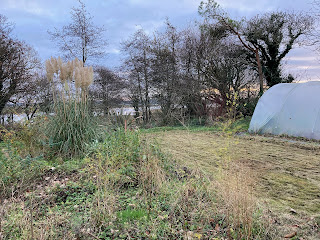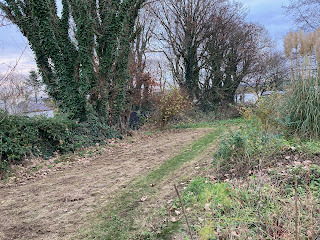Winter storms will unleash their fury, crashing breakers hurling rocks over the beach car park wall, but this winter is arriving on a gentle easterly breeze.
Next week it will swing round to become polar, bringing northerlies and braced nipples, but today, this week, it’s gentle.
Gentle and quiet.
Well apart from yer man’s JCB.
With no crowds at the beach, a soft whisper of silence swims the air.
When I pause between shovels of compost, my breath sounds like saws cutting whispers in half.
I love this about winter.
Somewhere else, there are millions running around like crazed beasts, preparing for Christmas, Hanukkah and Diwali; precisely what we should not be doing.
As mammals we’re meant to be taking it easy, sleeping a lot and - ah, well, here Christmas and Hanukkah hit the right notes - eating lots of high fat food to keep us warm.
Warm is good: it helps us to think; breathe; love life.
John the delivery driver arrives with a package, and sees me hobbling across the courtyard to meet him.
I’m limping and groaning like I’ve been shot up the arse with a blunderbuss.
“Jeeze Charlie, what’s up?”
“Fucked mate. Knackered. Been gardening like hell.”
”Gardening? In December? Are ya kiddin’ me?”
“You don’t garden, then, I take it, John."
“No. I know fuck all about gardening, as it happens.”
“Well, y’see, this is my busy time, ‘cos come July it’s good to sit and look. So I’m putting everything to bed with what they need, and sewing seed, and planting bulbs, and collecting leaves and-”
“Well yeh, I mean no, I mean never thought of it at all.”
“I love it mate, but need to get a lot done before it all freezes next week. Gonna be taters, guv’nor. Brass Monkeys.”
This impending cold spell couldn’t have come at a better time for me. It has forced me to get out and do these jobs that must be done, on the way wrenching my head free from a vice of darkness and dread, into a place of hope and relaxedness.
Climate change presents fresh challenges, but in a way they’ve always been there, because there are no absolutes in gardening.
There is no definitive right or wrong way to do things - it depends where you are, what time of year it is and what the weather’s like.
Sometimes the new warmth of November just messes things up, but often you can use the heightened temperatures to helpful effect.
I underplanted tulips in containers with a few wildflower seeds, thinking they’d look pretty for my friend’s daughter’s wedding in March.
The tulips we’ll see about, but the wildflower seeds went
“Blimey it’s warm, lads and lasses, time to wake up!”
germinated,
sprouted,
grew tall thin and fast,
took one look around, went
“Oh bugger it’s still last year!”
flopped down and died.
They won’t be back, unlike the comfrey I cut a month ago.
Taking what I believed was the last of its annual growth, I stuffed it into the compost bin, before my little winter composting break.
Like I said, there’s no rules, so every year I stop composting for a month or so, ‘cos I can.
Every winter I lift my containers onto rocks, so they don’t become waterlogged, water them well, and then mulch them, to leave them 'til spring.
The comfrey grew back straight away, so when the threat of first frost came, I put a layer of comfrey leaves under the mulch.
No idea if it’ll work, but figured layering this fresh comfrey growth like a verdant lasagne, it might leech some of its all-round goodness in the pots over the cold months.
And if there's any in doubt about climate change, say hello to my little December rose here. The green bits are the comfrey leaves I laid below.
All the fallen leaves have been stacked in a huge pile of black bin bags, to turn into leaf mould, but they need to be out of sight up the top meadow.
The trees in the orchard need to be mulched, to give their roots a winter duvet, and the grass in the top meadow needs to be stripped right down, with all associated cuttings gone, so that I can plant yellow rattle, the meadow maker.
Yellow rattle is semi-parasitic in grass, inhibiting grass growth and thereby allowing wildflowers to prosper.
Its seeds need several months of stratification, which is a fancypants way of saying cold weather, so right now they’re in my fridge, and early next week I’ll sew them on the mown ground where the grass was.
Then in February and March I’ll sew my filled tins and stuffed envelopes of last year’s wildflower seeds, and hopefully next July I’ll be showing you beautiful plants.
Meanwhile, back on the job, for three hours of three days, I blissfully lose myself in a beautiful solitary ballet (well, I'm accompanied by two robins.)
Two chronic lung conditions have forced me to slow down,
taking many breaks,
to catch my breath,
gasp at the sight of the tide rising in the silvery estuary.
These days I move at the speed of a caffeinated snail, but my pace is steady, stopping frequently to listen to the gabble of the Brent Geese back from the Canadian High Arctic, for a County Mayo winter.
I look, listen and appreciate the wonder of where I am.
Three bin bags full of leaves go in the wheelbarrow, which I take take up and dump at the far end of the top meadow.
Then I mow the long grasses, filling the wheelbarrow with three mower bags of cuttings.
If you don’t clear away the cuttings they will feed the soil, allowing the grass to beat the yellow rattle, and the wildflowers will be stifled.
Once the wheelbarrow is full I take it back down to the orchard, where I use the cuttings to mulch the trees.
Then I load three more bags of leaves, go back up, and repeat this happy productive protective cycle.
Slowly, bit by puffy bit, the job gets done.
Once that seed is in, my work will be done until the new year.
The bulbs are in their containers and along the driveway.
The foxgloves and fuchsia I grew from seed are in the ground.
The new herb garden is coming along splendidly in the potting shed, along with potentially many oak tress, thanks to Denis giving me sprouted acorns (sounds painful, I agree.)
Come March, a ton of grit will be poured into this square, now colonised by nasturtium.
In the shade of the bay tree and towering lovage from the other side of the wall, the new herb garden will be born.
On top of that grit will go a few bags of peat-free compost, and then I’ll plant out all those mediterranean herbs.
Oh, and there’s the forsythia, too. Three tiny leafless plants, behind the sage and next to the leafless witch hazel, which will in years to come be the first shrubs to burst into yellow splendour each spring.
He’s always in that shed.
God knows what he gets up to in there.
Well ain’t that the truth.
©Charlie Adley
03.12.2022













2 comments:
Lovely piece Charlie. Keep up the good work, looking forward to seeing the wildflowers when the time comes. Happy holidays!
Thanks, Anon. X
Post a Comment